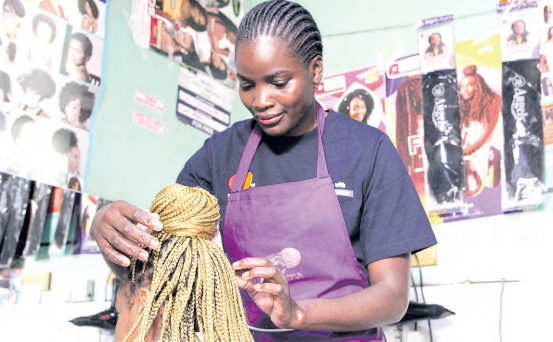
When Naomi Minage, 30, decided to leave her Malava home and travel to Nairobi six years ago in search of a better life, necessity was her only motivation. She did not even imagine that luck could one day come her way.
As the third-born in a family of 11, her early life was defined by both the struggles of having limited resources and the atmosphere of a big, close family.
She had just completed her Form 4 education and her parents could not afford to take her to college for further education, hence the urge to move out to hustle.
In Nairobi, her journey to success began with a stroke of luck when she landed her first job as a casual laborer at a flower farm in Limuru.
This rare chance to earn her own money gave her hope, but the reality was far from rosy. She worked for only six months before quitting as the tasks were not only physically demanding but the pay was also not enough to cover her basic needs.
In fact, she told us that she sustained injuries twice on her knee while at work, forcing her to abandon it.
“The job was tough but I encouraged myself to continue working until my manager told me to just leave and find a less tedious job, such as a hotel’s,” she said.
Struggling to make ends meet, Minage decided to take on any odd job she could find. She engaged a friend to help her find a hotel job but then got discouraged when she was informed she would be earning just Sh250 a day.
“I did my math and realised this would only translate to around Sh7,000 a month. It could not sustain me and my children, and so I decided to go find a salon job,” Minage says.
STUDYING OPPORTUNITY
With hairdressing being her last resort, the friend secured her a job at a salon some distance away from where she used to stay in Ruaka.
With only Sh10,000 she had saved from her previous job, she moved to the new area to start the new job.
However, there was another challenge: she lacked the skills required to meet all the clientele needs at the salon. As a result, she had to spend most of her time observing her coworkers’ work.
“It was really tough. A customer would come and all I could do is to request a colleague to help me,” she says.
“If the work cost Sh800, I would charge Sh500 because I did not want to ask for too much if the client was not satisfied, and they would understand,” she says.
With time, she gradually built connections until an opportunity to study provided by KCB Foundation’s partnership with Mastercard Foundation emerged.
Every year, KCB Foundation, through its flagship project 2Jiajiri, invites applications from youth to study at Vocational Training Centres (VTCs).
Through this ambitious project, Minage qualified for an education scholarship that saw her enrol at the Vera Beauty College in Nairobi to pursue a hairdressing course.
The programme is specifically tailored to unemployed and outof-school youth who want to gain skills to grow their micro enterprises.
It aims to provide them with technical skill training opportunities as well as upskilling and certifying existing micro-entrepreneurs who wish to move their business from the informal to the formal sector.
Minage is among the 28,000 beneficiaries who have been supported by the bank since the launch of the programme.
After a six-month training, she graduated with a certificate, emerging as the second-best performer in her class.
SH6K A WEEK
When we visited her at Naomiris salon, which she has recently opened in Ruaka, Kiambu county, Migane was beaming with smiles and could not stop giggling throughout the interview.
Perhaps a testament to her resilience and the unexpected ways in which lives can change. The bank has further supported her by donating a toolkit to help her start the business.
She was given shaving and blowdry machines, including some accessories, towels and a drier. On a wall facing the road at the salon are large inscriptions in beautiful colours of the services offered.
Among them are twist outs, braiding, cornrows, dread retouch and installation, ghanias and crocheting. She currently employs two work ers who help her in running the business and rakes in Sh6,000 a week on average after paying her workers.
This depends on the number of customers as it could go up. The training, she said, provided a perfect opportunity for her to gain new skills as she had already mastered the art of hairdressing.
“I can say I now have courage to take up this work. I have all the necessary skills required. You cannot compare it to when I worked for someone, I was very shy,” she says.
Migane now intends to use her story to inspire her children to work hard and to inspire others who want to be business owners.
She is now looking forward to her next visit home with a mixture of anticipation and nervous excitement. This trip would be different, she would not return empty-handed.
“Self-employment has a lot of benefits. I open at 9am and close at 9pm because the work can be overwhelming. I can’t get time to rest until I decide to give myself a break,” Minage says.
From her earnings, Minage has supported her parents and even her siblings by providing for their needs. She has now set focus on training other young girls in future as an appreciation of the support she got from the institution.
ABOUT 2JIAJIRI
2jiajiri is an enterprise development and wealth creation programme of the KCB Foundation. Its objective is to create and support new and existing enterprises in the informal sector through vocational training, business development services and market linkages.
The programme’s intention is that the increasing expansion and formalisation of enterprises will create employment opportunities.
It focuses on agribusiness, automotive engineering, beauty and personal care, building and construction and domestic services.

